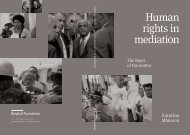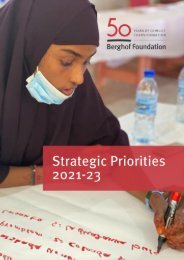Berghof Foundation: 50 years of conflict transformation
This book provides an overview of the Berghof Foundation’s work and impact over the past 50 years and sheds light on the challenges ahead of peacebuilding.
This book provides an overview of the Berghof Foundation’s work and impact over the past 50 years and sheds light on the challenges ahead of peacebuilding.
You also want an ePaper? Increase the reach of your titles
YUMPU automatically turns print PDFs into web optimized ePapers that Google loves.
Interview<br />
“<br />
Climate<br />
change<br />
will<br />
become<br />
the new<br />
focus <strong>of</strong><br />
peace<br />
research<br />
Pr<strong>of</strong>essor<br />
Dieter<br />
Senghaas<br />
Honorary Chair<br />
Board <strong>of</strong> Trustees<br />
<strong>Bergh<strong>of</strong></strong><br />
<strong>Foundation</strong><br />
The <strong>Bergh<strong>of</strong></strong> <strong>Foundation</strong> was founded in a spirit <strong>of</strong><br />
optimism, as the article on the previous page shows.<br />
Why was the establishment <strong>of</strong> government-funded<br />
peace and <strong>conflict</strong> research so important at that time?<br />
In retrospect, I suppose we might describe<br />
it as initial euphoria. But the background to the<br />
various initiatives promoting peace research was<br />
very different: the East-West <strong>conflict</strong>, which came<br />
to a head in the 19<strong>50</strong>s and 1960s. The ideological<br />
<strong>conflict</strong> with all its consequences divided the<br />
world, especially Europe and Germany. The danger<br />
<strong>of</strong> nuclear war was particularly acute in Europe.<br />
This was the backdrop to governmental and nongovernmental<br />
initiatives to promote peace research,<br />
especially in former West Germany.<br />
Looking back at the last <strong>50</strong> <strong>years</strong>, what have we<br />
achieved in peace and <strong>conflict</strong> research since then<br />
and what has the <strong>Bergh<strong>of</strong></strong> <strong>Foundation</strong> contributed?<br />
Government funding <strong>of</strong> peace and <strong>conflict</strong><br />
research began in the early 1970s. The establishment<br />
<strong>of</strong> two government-funded institutions — the Peace<br />
Research Institute Frankfurt and the Institute for<br />
Peace Research and Security Policy at the University<br />
<strong>of</strong> Hamburg — and the gradual integration <strong>of</strong> peace<br />
research into various disciplines at universities were <strong>of</strong><br />
particular importance. This welcome development led<br />
to a thematic expansion <strong>of</strong> peace research over time.<br />
In addition to armament dynamics, the focus<br />
<strong>of</strong> the research moved to issues such as aggression<br />
and violence, including the central question <strong>of</strong> how<br />
peace can be achieved and successfully shaped<br />
within society at a local level and in the regional and<br />
international context. The founding <strong>of</strong> the <strong>Bergh<strong>of</strong></strong><br />
<strong>Foundation</strong> also had an important impact on this<br />
development. As a private organisation, it was able<br />
to promote initiatives to broaden the thematic scope<br />
<strong>of</strong> research.<br />
At that time, the organisation focused<br />
particularly on promoting peace education projects<br />
in universities, schools and peace movements. One<br />
milestone reached as a result <strong>of</strong> this support was the<br />
Institute for Peace Education in Tübingen, which is<br />
still active both regionally and beyond.<br />
You are one <strong>of</strong> the few people to have been involved<br />
with the <strong>Bergh<strong>of</strong></strong> <strong>Foundation</strong> from the start. What is<br />
your experience <strong>of</strong> the organisation today and how<br />
does it differ from back then?<br />
In the first decades <strong>of</strong> its existence,<br />
the <strong>Bergh<strong>of</strong></strong> <strong>Foundation</strong> handed out grants for<br />
projects which were generally carried out by<br />
external partners. These efforts contributed<br />
significantly to the development <strong>of</strong> research and<br />
practical peace activities in Germany. Today, the<br />
<strong>Bergh<strong>of</strong></strong> <strong>Foundation</strong> focuses primarily on its own<br />
international activities, mainly in cooperation with<br />
experts and potential funders beyond its<br />
own borders.<br />
Looking to the future, the world is once again facing<br />
major challenges. How should they be addressed by<br />
peace and <strong>conflict</strong> research? And what kind <strong>of</strong> role<br />
do you envisage for organisations such as the<br />
<strong>Bergh<strong>of</strong></strong> <strong>Foundation</strong>?<br />
While the analysis <strong>of</strong> armament dynamics<br />
at the international and national level was once one<br />
<strong>of</strong> the main challenges that led to the emergence <strong>of</strong><br />
peace research, it is foreseeable that the obviously<br />
dramatic increase in climate change — albeit with<br />
different levels <strong>of</strong> intensity in different parts <strong>of</strong><br />
the world — will become the new focus <strong>of</strong> peace<br />
research. Here, the <strong>Bergh<strong>of</strong></strong> <strong>Foundation</strong> must<br />
succeed in what it failed to do in the first decades <strong>of</strong><br />
its activities, namely to build on the expertise <strong>of</strong> the<br />
natural sciences. This had always been the aim <strong>of</strong><br />
Pr<strong>of</strong>essor Georg Zundel, the founder <strong>of</strong> the <strong>Bergh<strong>of</strong></strong><br />
<strong>Foundation</strong>, since the early 1970s. However, social<br />
science contributions to solving scientific problems<br />
were still relatively unknown in the natural sciences<br />
at the time, which is why, with very few exceptions,<br />
no bridges were built between the two disciplines.<br />
Successful efforts in this direction, entirely in the<br />
spirit <strong>of</strong> the organisation’s founder, are long overdue<br />
and the conditions are more favourable today. I very<br />
much hope that these efforts will be successful. That<br />
is also my wish for the <strong>Bergh<strong>of</strong></strong> <strong>Foundation</strong> on the<br />
occasion <strong>of</strong> its <strong>50</strong>th anniversary.<br />
36<br />
37










